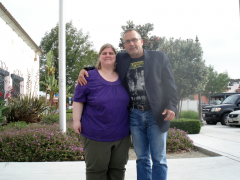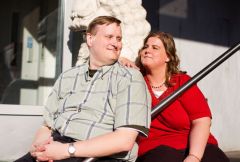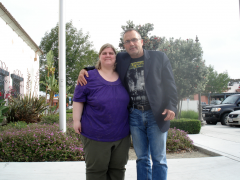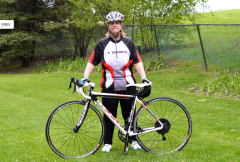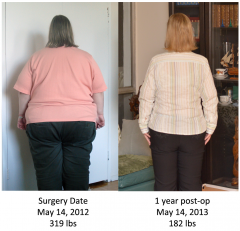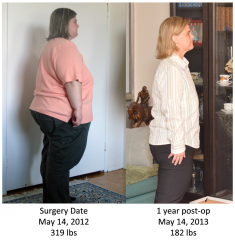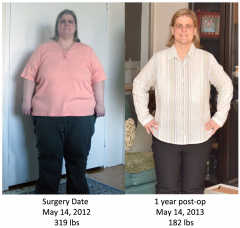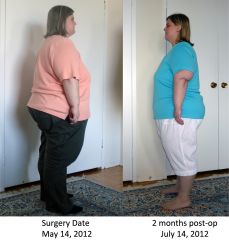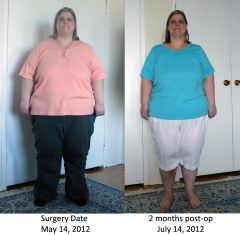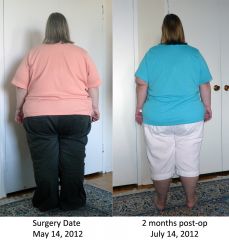-
Content Count
1,157 -
Joined
-
Last visited
Content Type
Profiles
Forums
Gallery
Blogs
Store
WLS Magazine
Podcasts
Everything posted by Webchickadee
-


Help...very confused
Webchickadee replied to patiscuba's topic in POST-Operation Weight Loss Surgery Q&A
If you look at my signature line you will see that I lost 22 lbs in my first month and that was the best month I ever had! You are NOT a slow loser! As you say, you don't want to be in starvation mode, you DO need to get your Protein in, and liquids help you stay hydrated. I am as confused as you are..... Is your doctor aware you are only 1 month post-op? Perhaps he has you confused with another patient? It looks like you're doing great to me. 600 calories is okay for right now (assuming that's mostly protein). It was at least 8 weeks for me before I was able to eat anything resembling solid food, so I had no choice but to drink liquid Protein shakes and powders. Mushies helped a bit, but no where enough to meet my needs. As you can see, I'm about 1 yr post-op now and even though my monthly loss steadily diminished and is quite slow now (5 lbs/month), I have managed to lose nearly 140 lbs. I now workout regularly 3-5x per week and need more calories and protein, so my daily calorie intake is about 1200 cal/day. I still have about 45 lbs to lose and it's slow now (4-5 lbs/month), but I'm VERY VERY happy and I know I will make my goal, even if it takes another year. It's not about getting there FAST, it's about getting their HEALTHY and STAYING at goal. If your doctor's advice seems wrong, I would get a second, third or fourth opinion and go from there..... -
From the album: Before photos
-
From the album: Before photos
-

Eva_Dr.Kelly_May_2012.png
Webchickadee posted a gallery image in Before and After Gastric Sleeve Photos
From the album: Webchickadee
-

Random pics along my journey....
Webchickadee added images to a gallery album in Member Photo Gallery
-
From the album: Random pics along my journey....
-

I love cycling! 1 year post-op (down approx. 135 lbs)
Webchickadee posted a gallery image in Member Photo Gallery
From the album: Random pics along my journey....
-

Softball again! 1 year post-op (down approx. 135 lbs)
Webchickadee posted a gallery image in Member Photo Gallery
From the album: Random pics along my journey....
Playing softball again (after 25 years of not playing due to being so overweight!) -

Webchickadee's Progress Pictures
Webchickadee added images to a gallery album in Before and After Gastric Sleeve Photos
-
From the album: Webchickadee's Progress Pictures
-
From the album: Webchickadee's Progress Pictures
-
From the album: Webchickadee's Progress Pictures
-


So far, not loving my sleeve
Webchickadee replied to Readytobeskinny's topic in Gastric Sleeve Surgery Forums
It's too early to think "it's over". Seriously, you are still in active healing and your body is adjusting to the shock of major surgery. Not to mention that MANY people hit a "stall" around Week 3 post-op, but it can be sooner or later. Each person/body is unique. You need to stay "on plan", stop weighing yourself every day (a sure way to drive yourself insane), and give yourself time to heal. It will be weeks before you settle into a "normal" eating routine and only then will you be in a better position to assess the real success of your VSG. Long term, the sleeve will give you ability to maintain your loses after you hit your goal weight. Weight watchers gives you "tools, techniques and support groups", to help you maintain, but no physical restriction. The sleeve "stops you in your tracks" if you eat too much. -


Dairy vs. soy vs. almond milk?
Webchickadee replied to Bufflehead's topic in Post-op Diets and Questions
Though your doctor may not have specifically mentioned carbs, I am sure your post-op diet has reduced them substantially. The main reason being that we MUST have sufficient Protein intake to maintain our muscle base. That leaves very little room for carbs. So you are dealing with carbs (and focusing on them) by ignoring them! Carbs are what got most of us to the point of surgery. Whether from liquids (high fructose corn syrup in soda is the main culprit), candy, chocolate, breads (we love our bread, pizza and pasta/noodles!), or Desserts such as ice cream, pastries, donuts, cakes, Cookies, etc. And dont' forget potatoes (fried, baked, mashed, scalloped........they are big-time favourites!) If you look at all the things I've listed above, post-op you have probably eliminated ALL of these items. In comparison to what you were eating pre-op, you are on a SUPER-LOW carb diet now! That being said, not all carbs are bad for you. The body needs complex carbs, such as those found in beans/legumes, grains (such as barley, bulgar, wheat berries, and quinoa), and, believe it or not, even popcorn (air popped, no butter in small quantities (3 cups popped). This is especially true as you begin to increase your activity levels and are training harder. Your body needs the energy from complex carb metabolism to feed itself and help you achieve your performance goals. If you choose to drink skim milk, that's great! I was simply was showing the difference between "milk" choices and my preference. If you are approaching your post-op nutrition holistically, you need to be fully informed as to what the body needs, how it uses it, and what your food is made of. I learned the value of reading labels, and opening my mind to new food knowledge, years ago . I only really started putting my self-taught nutrition knowledge into practical use about 13 months ago (1 month before my surgery). As a result, I have been able to lose close to 140 lbs in that year and obtain a level of fitness I have not had in 25 years (when I was 18 yrs old). And it only gets better from here! -


Dairy vs. soy vs. almond milk?
Webchickadee replied to Bufflehead's topic in Post-op Diets and Questions
See the quick comparison chart I just created to help you choose..... I drink Light Soy Milk, and occasionally some coconut milk (for a fun, creamy flavour). Cow's milk has too many carbs for my liking. I'd rather get my carbs from food I can chew, rather than drink (since I try to keep the carbs moderately low). -
You WILL feel better after 3-4 days as you kick your carb addiction (most of us have one...). As to beating the challenge of the pre-op diet, it really is alot of about how you approach it mentally. I posted this a few weeks ago and it seems to be helping some people get their mindset ready for their pre-op. Perhaps it might help you: (original posting was here: http://www.verticalsleevetalk.com/topic/78443-the-pre-op-diet-is-not-a-punishment-its-an-opportunity/)
-


Food is kinda gross when I slow down to actually taste it
Webchickadee replied to lyndeeboo's topic in PRE-Operation Weight Loss Surgery Q&A
Believe me, after surgery, eating small will only be a challenge until you start feeling the restriction. It will stop you in your tracks! But eating slow is an entirely separate thing altogether. I still struggle with that, and I'm more than 1 yr post-op! The most important reason to do the slow eating (other than to give yourself more enjoying and satisfaction with your meals) is to catch yourself before you overeat. As we have no "reserve" capacity in our stomach, and no stretch receptors to signal to our brain that we are full, going over even by a bite or two can mean "slimies", discomfort and sometime even vomitting. I've been lucky, as I started out measuring my food from the beginning so I wouldn't "eyeball" my quantities and overeat. My brain was always telling me what I had measured out to eat wasn't enough. But once I started eating it, I realized it was enough and sometimes even too much, even though the weight was within my food plan guidelines! After decades of "eating to capacity" and living in a "super-size me" culture, it's hard to retrain your brain. That's where the "tool" of the VSG comes in to save the day (and your life). -


I miss my vodka!
Webchickadee replied to aamandddaaaahunt's topic in POST-Operation Weight Loss Surgery Q&A
-
What about something TOTALLY different, like swimming? Or yoga? It could help with keeping your muscles stretched and loose (lifting tends to make them contract and stay tight, long after you're done), and could also help with flexibility. And the swimming will also work your cardio.......
-


I miss my vodka!
Webchickadee replied to aamandddaaaahunt's topic in POST-Operation Weight Loss Surgery Q&A
I posted on this EXACT question 2 days ago: Now, with greater experience, and most than 1 year post-op, I feel I can elaborate a bit more. I would STRONGLY advise against drinking ANY alcohol so early after surgery!!!!! Alcohol dehydrates your body. At the moment, your everyday battle is staying hydrated and allowing your surgical site to heal. The lime in the margarita will likely irritate your stomach lining, causing great discomfort. The alcohol will get you drunk VERY fast in VERY small quantities, and you will not be in good control of your decision making regarding other foods, which could lead you to make dangerous decisions around what is safe to eat so early on. Feel free to go out with your friends, but take on the role of designated driver (if you don't want them to know WHY you're not drinking), or just tell them you are staying away from alcohol for a while because it conflicts with some meds or supplements you're taking. Of course that all assumes they don't know about your surgery. If they know, tell them the truth! Your surgeon and nutritionist have strongly advised....NO DRINKING for min. 6 months post-op. You surgeon may not have spelled that out to you (though hopefully it was discussed). The physical effects of alcohol are bad, but the psychological possibilities of developing a new dependency or addiction (alcohol vs food) are very real and serious and worse than the hangover and illness the booze might temporarily cause you. Even if the addiction part is not "in play" here, the possibility of your having less control of your decision regarding food at the concert is still very real if you've been drinking. You really can't afford to slip up and eat the wrong thing this early post-op. It could have serious repercussions and land you in the hospital with a leak or complication you could have easily avoided. You made a smart choice with this surgery. Keep up the good choices and stay away from alcohol until you're better healed and in a more normal eating/drinking routine. -
Headaches are probably a sign of carb purging. It will probably improve quite a bit after the 3rd day. Hang in there! You can do this...... I posted this a little while ago: http://www.verticalsleevetalk.com/topic/78443-the-pre-op-diet-is-not-a-punishment-its-an-opportunity/
-


How soon is TOO SOON for a little alcohol?
Webchickadee replied to lankymom's topic in Gastric Sleeve Surgery Forums
This was a post I made in December last year (2012) just before we went to an all-inclusive resort for a holiday: Now, with greater experience, and most than 1 year post-op, I feel I can elaborate a bit more. I would STRONGLY advise against drinking ANY alcohol so early after surgery!!!!! Alcohol dehydrates your body. At the moment, your everyday battle is staying hydrated and allowing your surgical site to heal. The lime in the margarita will likely irritate your stomach lining, causing great discomfort. The alcohol will get you drunk VERY fast in VERY small quantities, and you will not be in good control of your decision making regarding other foods, which could lead you to make dangerous decisions around what is safe to eat so early on. Feel free to go out with your friends, but take on the role of designated driver (if you don't want them to know WHY you're not drinking), or just tell them you are staying away from alcohol for a while because it conflicts with some meds or supplements you're taking. Of course that all assumes they don't know about your surgery. If they know, tell them the truth! Your surgeon and nutritionist have strongly advised....NO DRINKING for min. 6 months post-op. You surgeon may not have spelled that out to you (though hopefully it was discussed). The physical effects of alcohol are bad, but the psychological possibilities of developing a new dependency or addiction (alcohol vs food) are very real and serious and worse than the hangover and illness the booze might temporarily cause you. Even if the addiction part is not "in play" here, the possibility of your having less control of your decision regarding food at the concert is still very real if you've been drinking. You really can't afford to slip up and eat the wrong thing this early post-op. It could have serious repercussions and land you in the hospital with a leak or complication you could have easily avoided. You made a smart choice with this surgery. Keep up the good choices and stay away from alcohol until you're better healed and in a more normal eating/drinking routine. -
Ditto on that! I have been obese (and morbidly so) since I was 10 years old. I'm 43 now. In the past year (my surgiversary just passed), I have lost 137 lbs and I'm 47 lbs from goal. It's had its challenges, but for the most part, pre and post-op have been fairly straight forward (no complications, minimal pain). The biggest regret for me was also not doing it a long long time ago. I would do this again 1000x and I had my surgery in Mexico (self-pay).
-


Help! What is wrong with me?
Webchickadee replied to Marquel's topic in POST-Operation Weight Loss Surgery Q&A
Yes. We ALL struggle! The biggest struggle of all is what you are experiencing right now. The MENTAL game. This surgery is a tool to help you change your habits, your lifestyle and your mindset. If you don't "get in the game" from that perspective, you won't succeed long term and you will not be the healthy person you want to be. The fact that you are posting about this struggle means you are aware of it. That's great news! If you know it, and admit it to yourself, you can change it for the better! From a nutritional perspective, the reason you are probably not feeling energetic enough to exercise is because you are not eating the right food to fuel your body. You are losing weight, but you may not be losing fat! It is much easier for your body to break down muscle tissue to scavange energy than fat. So if you don't provide your metabolism enough Protein to maintain and build muscle (which is built using protein), you will lose baseline muscle. We already lose muscle just by aging. Don't rob yourself of your strength, stability and future core health by eating junk instead of protein now! The rules are: 1. Protein first 2. Vegetables next 3. Carbs if (and only if) there is room left in your stomach and your daily nutritional alottment You need to make a realistic daily nutritional guideline for yourself (see a NUT if you can, or talk to your surgeon's office for some guidelines). Then start tracking everything you put in your body (and I mean every bite, every sip). Are you meeting your baseline requirements? They are often something like this: 60+ g of protein daily 600-800 calories per day (this will climb as time goes on - I currently eat appox. 1100 cal/day, and I'm 1 yr post-op) carbs <60 g per day min. of 64 oz of Water per day These numbers will vary greatly from surgeon to surgeon and NUT to NUT. But the baseline is similar and the most important part is to know what you're eating and have a goal you reach for EVERY DAY. That doesn't mean you can't treat yourself to a bit here and there (no one is perfect and we need to be human about this). But if you allow something outside of the plan, do it consciously, "earn" it with extra exercise, and don't make it a habit! You must do this EVERY DAY for months at a time (I'm 1 year post-op and I log everything, every day). It will become normal, and you will find you don't slip off-track very often when you hold yourself accountable for every bite. Lastly, you must find a way to incorporate exercise into your daily routine. Start with walking. After a while, as you get better at it, you will want to push yourself more and perhaps run, or do organized sports, or ride a bike, or hike. There are thousands of ways to push your body to a better athletic condition, and it makes you feel GOOD. Believe me. It's about changing your lifestyle so that it becomes your "new normal". Then you can truly say you did everything you could to succeed, and feel good about the effort AND the results. And about your fantastic, healthy, energetic body.


